Standing in the humid heat of the South American nation of Guyana, in a small settlement with armed and stationary guards, 900 people tightly gripped their cups. They lifted them to their hot, dry lips, tipped their heads back and took one resounding gulp. “Drinking the Kool-Aid” they call it now.
It would be the last thing they ever did.
Minutes later, 909 bodies carpet the hot ground, a third of them children, small and lifeless. Many with their arms wrapped around each other, as if living and dying in the steady synch of each others’ slowing, soothing heartbeat.
Jonestown leader, Jim Jones, sits scrunched and lifeless in a chair with a single, sweeping bullet wound to the head. With the power of manipulation and idealistic aspirations, Jones created a following that led to a tragedy.
People are easily manipulated. That certainly didn’t end in the ’70s.
In Margaret Thaler Singer’s book “Cults in our midst: The continuing fight against the hidden menace” she argues the ever-prominent concept of the cult.
“We are all being influenced all the time. And we all are potentially vulnerable to a cult’s pitch, especially as our society becomes more and more commercialized, violent and alienating, dishonest and corrupt, polarized and without structure,” wrote Singer.
Today, social media has a consistent stream of attention-grabbing groups reaching their fists through your device screen and trying to pull you into a scheme. Are we redefining manipulation and cults into everyday life? What are these schemes today?
In recent years, the concept of a pyramid scheme has become more prominent, despite being illegal in the U.S. This is a business model that recruits members via a promise of payment for enrolling others, rather than actually supplying them investments. Another similar concept is a multi-level marketing business or an MLM, which is a direct sales home business where representatives sell products to a consumer. They rely on representatives to then recruit and make sales.
 In fact, the Federal Trade Commission keeps a close eye on MLMs. They aren’t technically illegal, they just like to hang out right on the edge of acceptability. The FTC reported that 99% of recruiters lose money. A staggering 1% gain from the experience.
In fact, the Federal Trade Commission keeps a close eye on MLMs. They aren’t technically illegal, they just like to hang out right on the edge of acceptability. The FTC reported that 99% of recruiters lose money. A staggering 1% gain from the experience.
The issue here is that these groups often prey on what is considered “weak” on these different platforms. This is often college-aged women (constantly looking at influencers on social media and hoping to get to that level) as well as those who are single, disabled or military moms.
What do they all have in common?
A need for money and a desire to not leave the house unless absolutely necessary.
According to an article from HuffPost titled “MLMs are a nightmare for women and everyone they know” people buy into MLMs in order to achieve a sense of independence, in whatever form that may be.
“The keyword ‘empowerment’ is used in a lot of their training. ‘They’re connected with the feminist movement to make it feel like this is something that will empower women …’ Perform a quick search of social media posts by MLM companies and you’ll find posts emblazoned with phrases such as ‘boss babe’ and ‘SheEO,’” wrote Casey Bond.
MLM companies are throwing the idea of empowerment into social media recruiting.

The AARP reports that 1 in 13 adults over the age of 18 participated in at least one MLM organization. That only increases the odds for every person on their feed receiving that infamous recruiter message which is lengthy, has way too many emojis and has to include “fake nice” words like “heyy,” “boss” or “babe.” It’s become associated with the artificial or fake nature of social media.
A user on Reddit who goes by u/chandapanda88 posted on the thread r/antiMLM about their experience with a MLM online. They found a job online and met up with a guy at Panera Bread. He seemed disinterested in her answers and suddenly pulled out a binder that contained what the user deemed “The Plan.” After a month into the job, they had six down lines that were “barraging their friends and family with this shit.” They compared it, pretty accurately, to a cult. In fact, “People use religious rhetoric and pander to conservative Republican Party members shamelessly, talking about how ‘I had a God-shaped hole in my heart…’”
They were involved in a group called Amway which is one of the largest direct-selling companies.
Suddenly, the user realized just how much money they had lost in the process. But it was more than the money; it was the feeling of tricking people “into buying overpriced soap and toilet paper” and “how to fight against the ‘pyramid scheme’ rebuttals and write off naysayers saying they ‘just don’t get it.’”
So, how do these groups convince people to dish out their dirty marketing deeds on other people?
Like any cult classic, they have a leader, they recruit using a follower-leader dynamic and they target people in ways that are meant to, in many ways, brainwash them into submission. Jim Jones would feel right at home.
Young women have become so accustomed to the tacky, over-friendly DMs on social media from girls they barely knew in high school, it’s become a pretty common trope on social media to call them out and to let other people know the warning signs.
Twitter user “bee lawyer” (@vicunad) details the signs that show a possible “good opportunity” is just an MLM company in disguise.
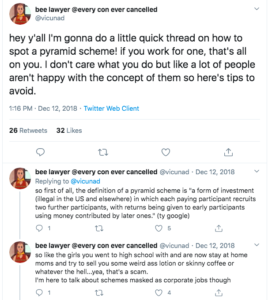
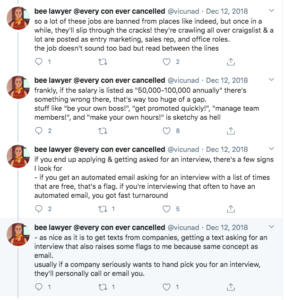
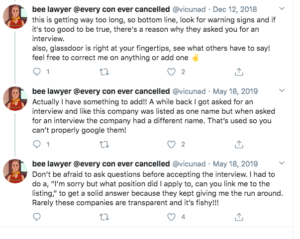
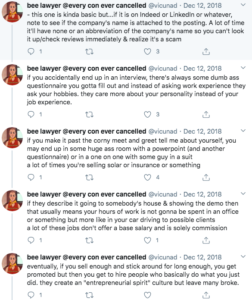
Screenshots from Twitter user “bee lawyer” (@vicunad) thread
While some MLMs are just selling mediocre products to make a gain, others are selling false hope, therefore impacting people’s emotional responses and wellbeing. It makes women cautious of female-to-female relationships, especially on social media.
One example that Reddit user u/halfevil_333 posted on r/mlmscams gives an example of a relatively new MLM that sells skincare and makeup. The company is called Limelife.

An image from Reddit thread r/mlmscams
With a few drops of two products, both second and third-degree burns will vanish. So, what happens when groups use people’s unrealistic hopes and desires to make a profit?
It contributes to an abundance of fake information on the web, and even more, the increase in the kind of alternative medicine use that can be harmful when consistently replacing traditional medicine.
One example is the MLM company Isagenix, which is known for its weight loss products such as shakes. Isagenix representative Stacy Russell, runs a site where she moans about the toxins in her life. She felt she was “poisoning my children with everything I did.”
What’s her favorite testimonial from a parent?
“In June of last year, we began replacing one meal a day for our son with Autism with an Isagenix Isalean shake. As you can see, the results speak for themselves. One thing we didn’t count on … he has had an EXPLOSIVE increase in speech and communication and his academics are skyrocketing! I’ve never seen him make progress like this before. There is NO DOUBT in my mind that Chase’s increased memory, happier demeanor, new found conversation skills and the lack of digestive issues he once had, is due to adding this shake to his diet…”
Oftentimes, women are trained to compete. Images in the media are meant to inspire change, rather than appreciation. Groups like MLMs are creating a situation where the possibility of female friendship is used as a hoax for financial reasons.
The article “How MLMs – multilevel marketing schemes – are hurting female friendships” from The Mercury News, tells the story of Jamie Birdwell-Branson who after meeting up with an old high school friend, realized that they were trying to recruit her to a famous skin-care company, Arbonne.
“The pressure to sell and recruit has led to underhanded tactics that strain, fracture and sometimes end friendships and family relationships. Is dinner with an old college roommate just about getting caught up on the past decade or is something else afoot? Increasingly, it’s the latter, and it leaves women on the receiving end feeling duped, angry and not sure how to respond.”
It’s certainly not an attack on a person’s intelligence either. As Reddit user u/cyberapple points out they “genuinely believed that this girl wasn’t fooled quite easily, given her ambitions and certifications. But like the saying goes, it’s easier to fool someone than to convince them they’ve been fooled.”
Former MLM workers also run their own blogs and denounce the work they did. Former Younique representative Elle Beau runs a blog site titled “Elle’s #Poonique Story.”
Here she recounts everything from being roped in to dealing with obnoxious fellow reps and then eventually calling it quits.
A particularly interesting story had to do with her mother-in-law finding out that the product she was selling her was way cheaper on eBay. Enter, the hun squad.

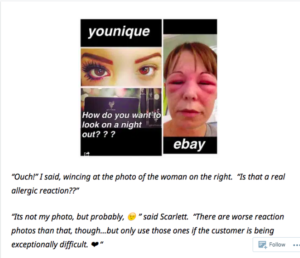
Screenshots from Elle Beau’s blog site
The new age of cults exists on social media. It’s no longer “drinking the Kool-Aid,” it’s now the idea that taking supplements saves lives and essential oils cure everything and being a CEO is one DM away.
Cheers to having another excuse for your family and friends to hate you.

